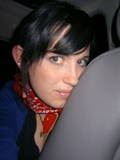From Study Guides to Poststructualism: Teacher Transformations
I enjoyed this chapter in Appleman's book. I think that everything that I've read so far has been very helpful and informative. This chapter just boosts this for me. I enjoy hearing teachers stories of how they have changed with time and more experience. Martha's experience and transition as a teacher is one that all teachers new and old need to read. The old Martha reminds me of my pre-internship mentor. She was extremely text-centered and traditional. Her student's oozed with boredom, as did I. While I was in her classroom she used texts that were found in every eleventh grade classroom; Faulkner, Fitzgerald, Hemmingway. The way she discussed the literature reminded me of writing a book report; rising action, climax, falling action. She also introduced terms and themes. I could not help but think about presenting these texts in a way that demonstrates that these are important peices of literature. With the use of theory, the student's would've acheived this. My mentor needs to go through a transitional period like Martha. I like how Appleman uses Martha as an example of the transitions teachers go through.
"She developed a more inquiry-based approach to literature, inviting student to develop their own questions about texts rather than memorize answers to her questions. She also abandoned her strictly chronological approach to literature in favor of a thematic approach that focused on the relationship between historical events and the literature of time" (119).
I think that this is awesome! Allowing the students to develop their own questions about the characters is an approach to reader-response. This makes way for other theories to be introduced.
I enjoyed reading how Martha's new classroom is set up in comparison to her old one. Having the "essence of students" all over her walls promotes an atmosphere where learning is fun.
Ongoing teacher research and development is crucial, especially with the age of technology here. Not being afraid of collaboration allows to put the student in center of the class. "Through active research, opportunity for reflection, collaboration, and curricular innovation, teacher not only can transform their own disciplinary knowledge but can set the stage for wider curricular reform as well" (129-130).
Being an ENGL 1000 instructor, I use reflection a lot. I keep a journal about my lessons and the reactions of my students for every class. Having this allows me to look objectively on my lessons and how they worked, or didn't. I think that doing reflections does improve teacher effectiveness. To me, Martha is a role-model for how I would like to run my class.
Subscribe to:
Post Comments (Atom)

No comments:
Post a Comment